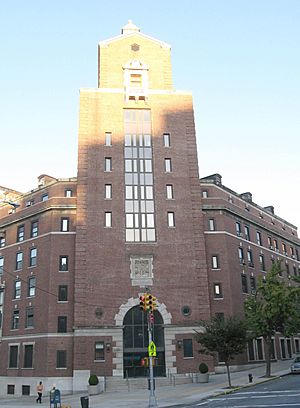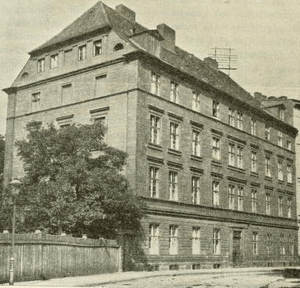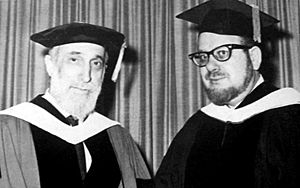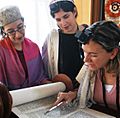Conservative Judaism facts for kids
Conservative Judaism, also known as Masorti Judaism, is a modern way of practicing Judaism. It started in the United States in the early 1900s. This type of Judaism is special because it tries to keep old Jewish traditions while also being open to modern ideas.
Here are some key things about Conservative Judaism:
- It is committed to following traditional Jewish laws and customs.
- It teaches Jewish principles of faith in a way that is not too strict or old-fashioned.
- It has a positive view of modern culture and new ideas.
- It accepts both old ways of studying Jewish texts and new ways using modern research.
The name "conservative" means that followers want to conserve (or keep) Jewish traditions. It does not mean they are politically conservative. Because of this, outside the United States, it is often called Masorti Judaism. "Masorti" is a Hebrew word meaning "Traditional."
Contents
History of Conservative Judaism
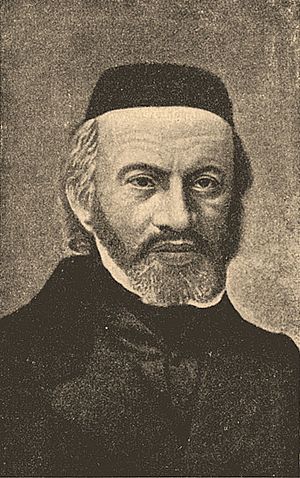
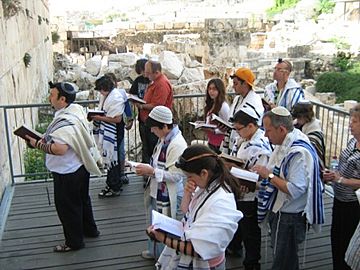
Like Reform Judaism, the Conservative movement began in Europe and the United States in the 1800s. This was a time when Jews were reacting to big changes from the Enlightenment and Jewish emancipation. In Europe, this movement was known as Positive-Historical Judaism.
Positive-Historical Judaism started in Germany in the 1840s and 1850s. Its main founder was Rabbi Zecharias Frankel. He disagreed with German Reform Judaism because it stopped using the Hebrew language much in Jewish prayers. In 1854, Frankel became the head of the Jewish Theological Seminary in Breslau, Germany.
Frankel taught that Jewish law was not stuck in time. Instead, it had always changed and grown to fit new situations. He called his idea "Positive-Historical." This meant people should have a positive attitude towards Jewish law and tradition. But they should also be open to letting the law develop, just as it always had throughout history.
Frankel did not like the new ideas of Reform Judaism. He felt they were not based enough on Jewish history. However, Frankel used modern ways to study Jewish texts. This made him different from Orthodox Judaism, which was also growing at the time.
Conservative Judaism in America
In the late 1800s, similar discussions happened in America. Conservative Judaism in America also started because of Reform Judaism's changes to traditional Jewish law. A big event happened in 1883, called the "Trefa Banquet." At this dinner, non-kosher foods like shellfish were served. This was at a celebration for the first graduating class of Hebrew Union College.
In 1885, the Reform movement created the Pittsburgh Platform. This platform said that many Jewish ritual laws were old-fashioned. This created a lasting split between the Reform movement and more traditional American Jews.
In 1886, Rabbis Sabato Morais and H. Pereira Mendes started the Jewish Theological Seminary (JTS) in New York City. This was a more traditional choice than Hebrew Union College. JTS was small until 1902, when the famous scholar Solomon Schechter became its president. Under Schechter, JTS became a respected center for Jewish learning. In 1913, the Conservative Movement created its group for synagogues, called the United Synagogue of America.
Conservative Judaism grew very quickly in the first half of the 20th Century. It became the largest Jewish group in America. It mixed modern ideas, like men and women sitting together in synagogues, with traditional practices. This appealed to Jewish immigrants from Eastern Europe. They found Orthodox Judaism too strict, but Reform Judaism too different.
After World War II, Conservative Judaism continued to do well. In the 1950s and early 1960s, many new synagogues were built. This was when American Jews moved to the suburbs. Conservative Judaism was seen as a good middle ground.
However, in the 1960s, the movement faced challenges with changes in American society. Some people felt the movement was too slow to change. In 1968, a group left to form Reconstructionist Judaism.
In the 1970s and early 1980s, the movement debated women's roles. In 1973, the Committee on Jewish Law and Standards allowed women to be counted in a minyan (the ten adults needed for a prayer service). But it let each synagogue decide if they wanted to be fully equal. After ten more years of discussion, in 1983, JTS voted to allow women to become Conservative rabbis. Some people who disagreed with this decision left to form the Union for Traditional Judaism.
Outside the USA, Conservative Judaism is known as Masorti Judaism. Today, the main groups of Conservative Judaism work together through the Leadership Council of Conservative Judaism.
Beliefs of Conservative Judaism
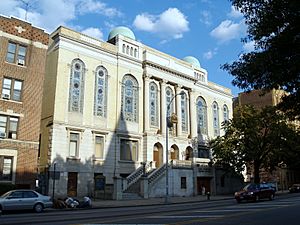
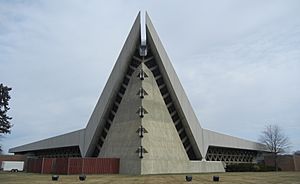
Conservative Judaism believes that Jews should hold certain beliefs. However, it also understands that the Jewish community has never had one single, strict list of beliefs. Instead, a book called Emet Ve-Emunah (which means "Truth and Faith") allows for different Jewish beliefs. Conservative rabbis believe these different ideas are still truly Jewish.
So, Emet Ve-Emunah says that people should believe in God and that God revealed the Torah to the Jews. But it also says that there can be many ways to understand these ideas.
God
Members of Conservative Judaism have different ideas about what God is like. No single way of understanding God is required.
Revelation
Conservative Judaism believes that God inspired prophets to write the Torah (the first five books of Moses) and the rest of the Hebrew Bible. However, most Conservative Jews do not believe that God spoke every single word of the Torah to Moses at Mount Sinai.
Conservative Jews are comfortable with the idea that the Torah we have today was put together from several older writings. They believe that God did reveal His will to Moses and other prophets in some way. But these messages might have been passed down in many forms, like written stories, folk tales, or epic poems. These records were later combined to form the Torah and other books of the Tanakh (Hebrew Bible).
Jewish law
Conservative Judaism sees Jewish law as important and something to follow. However, it also believes that Jewish law can and should change to fit the changing lives of Jewish people. Conservative Judaism thinks that this idea of Jewish law growing and adapting is very much in line with Jewish tradition.
Conservative Jews are expected to follow ritual laws. These include the laws of Shabbat (the Jewish Sabbath or day of rest), the laws of kashrut (keeping kosher food rules), praying three times a day, and celebrating Jewish holidays and life events.
Views on other Jewish groups
Conservative Judaism believes that Orthodox Judaism is a true and valid way of practicing Judaism. It respects the rabbis of Orthodox Judaism.
Even though the Conservative movement has different ideas from more liberal Jewish movements, it respects the right of Reform and Reconstructionist Jews to understand Judaism in their own way. So, the Conservative movement recognizes that these groups can exist and that their leaders are rabbis. However, it might not always agree with their specific decisions on Jewish law.
How Conservative Judaism is Organized
Conservative Judaism is a connected movement. The main group for Conservative rabbis around the world is the Rabbinical Assembly (RA). The group for synagogues is the United Synagogue of Conservative Judaism (USCJ). The main schools where rabbis are trained are the Jewish Theological Seminary of America (JTS) in New York City and the Ziegler School of Rabbinic Studies in Los Angeles. Outside the USA, Conservative Judaism is often called Masorti Judaism, and their rabbis also belong to the Rabbinical Assembly.
Other schools for rabbis include the Marshall Meyer Seminario Rabbinico Latinoamericano in Argentina and Machon Schechter in Jerusalem.
Many Jews, even those not formally part of these groups, see Conservative Judaism as a broader way of thinking about Jewish life.
Jewish Identity
Conservative Judaism follows the traditional Jewish understanding of who is a Jew. A person is Jewish if their mother was Jewish, or if they officially convert to Judaism according to Jewish law and tradition.
Images for kids
-
The Jewish Theological Seminary of America in New York City, a main school for Conservative rabbis.
-
Morning service in synagogue Adath Israel, Merion Station, Pennsylvania.
-
The Ziegler School of Rabbinic Studies at American Jewish University.
See also
 In Spanish: Judaísmo conservador para niños
In Spanish: Judaísmo conservador para niños
 | William M. Jackson |
 | Juan E. Gilbert |
 | Neil deGrasse Tyson |


